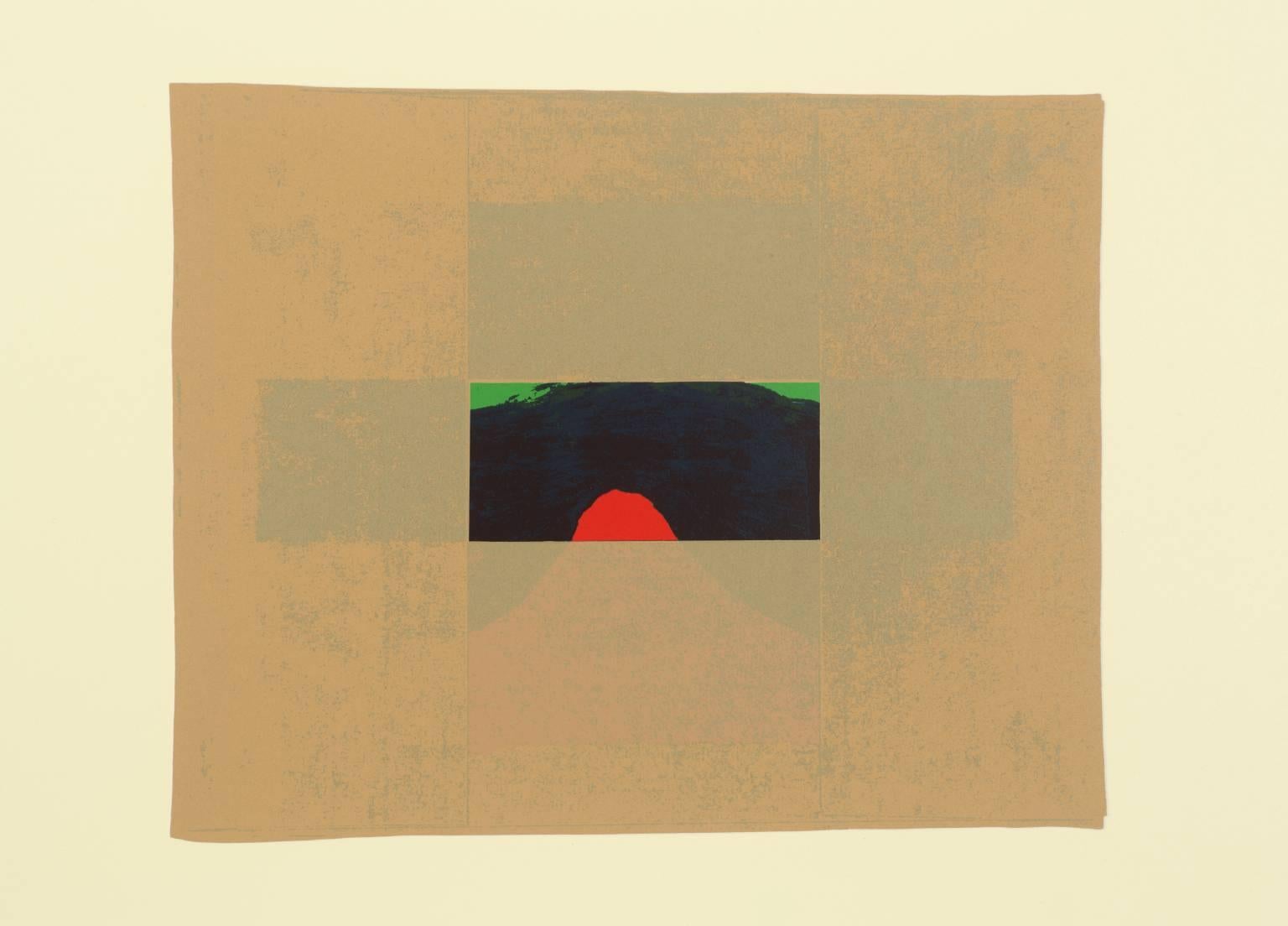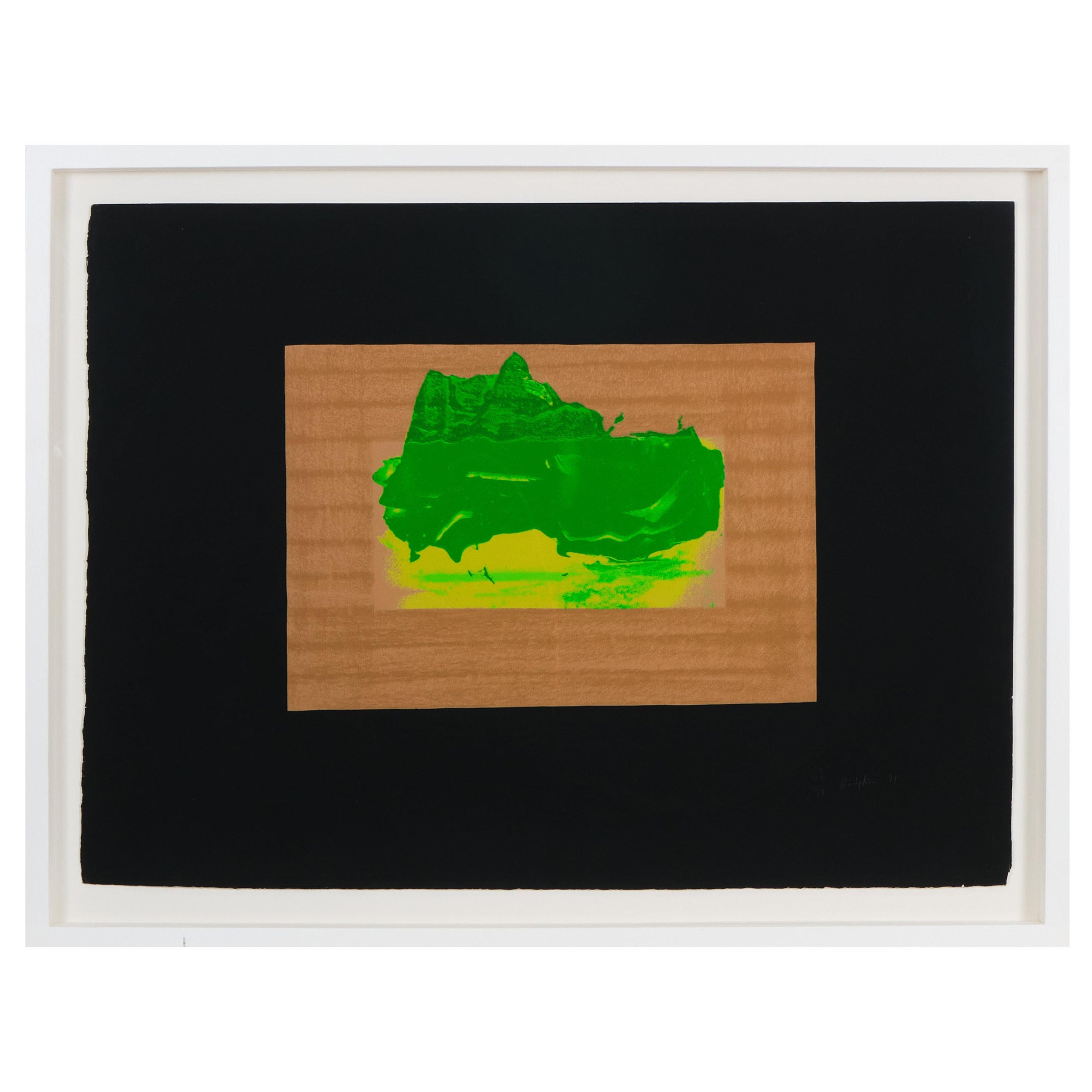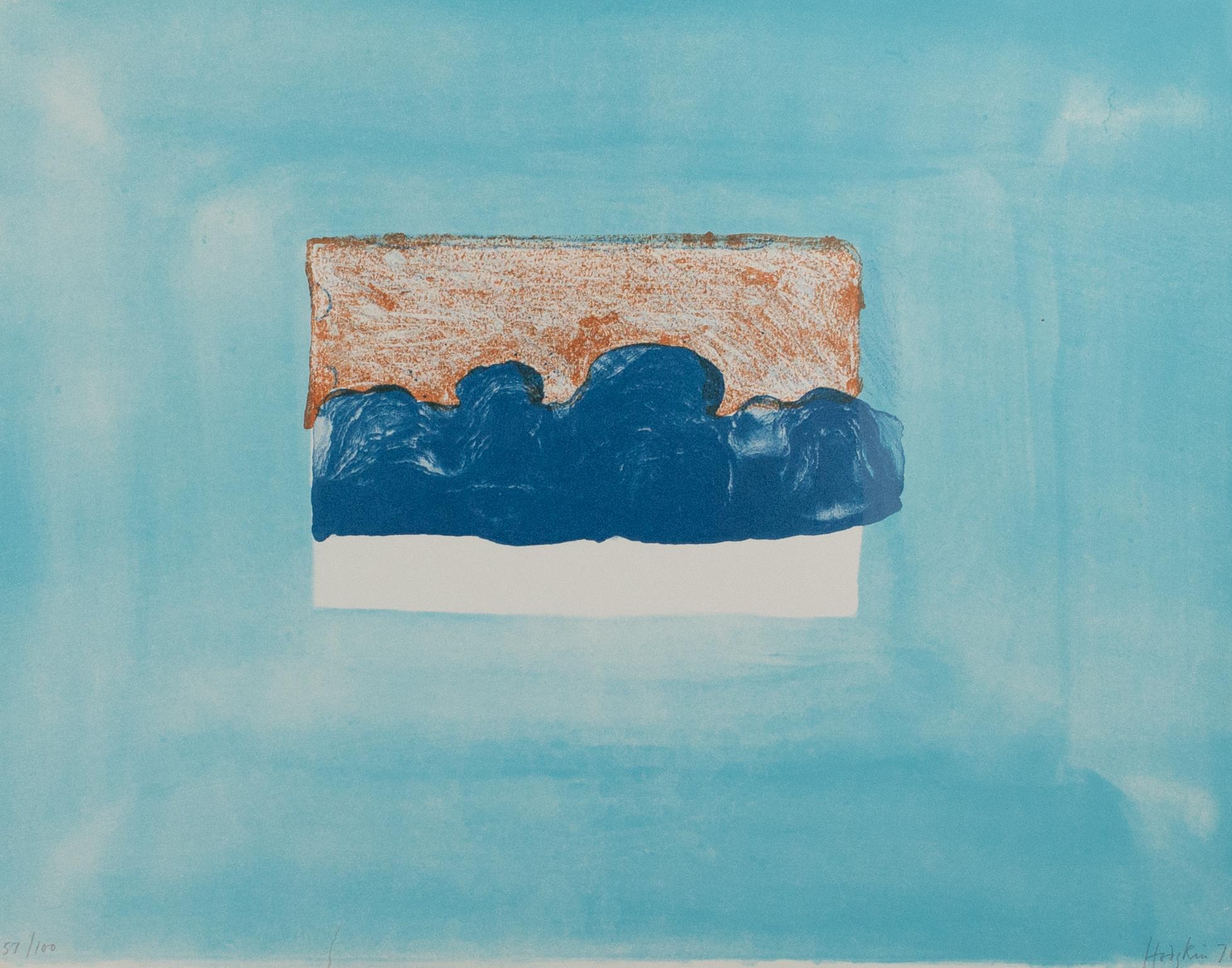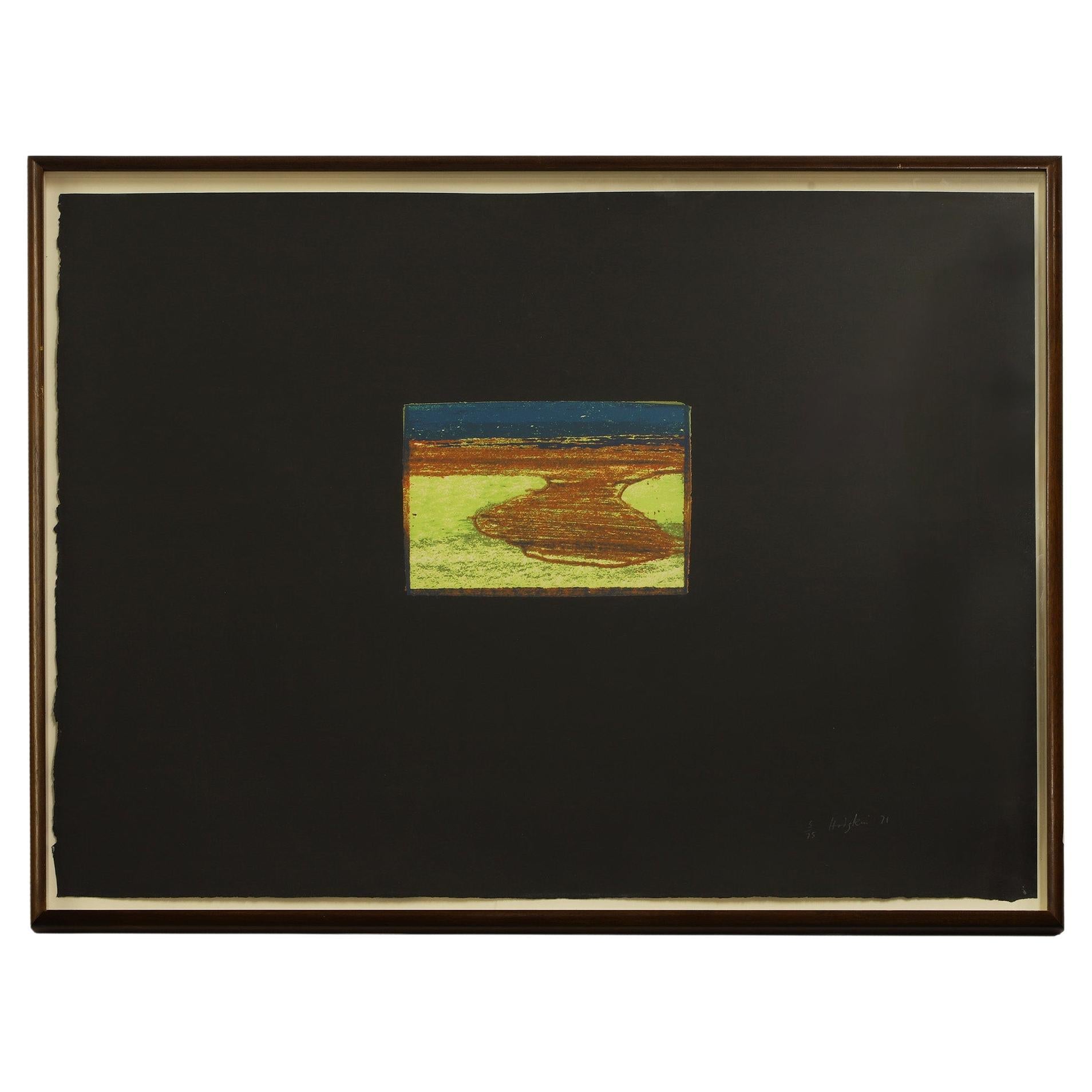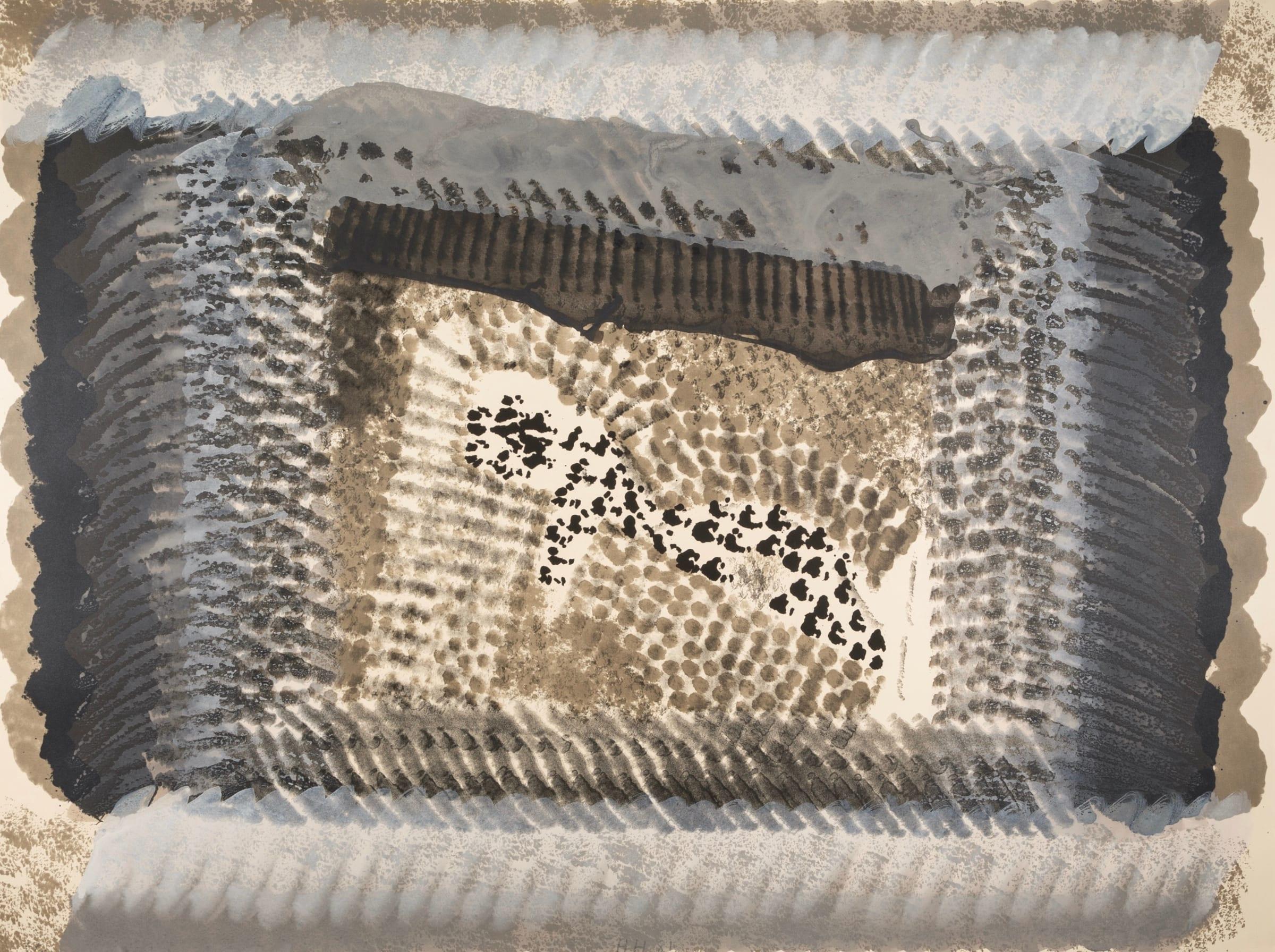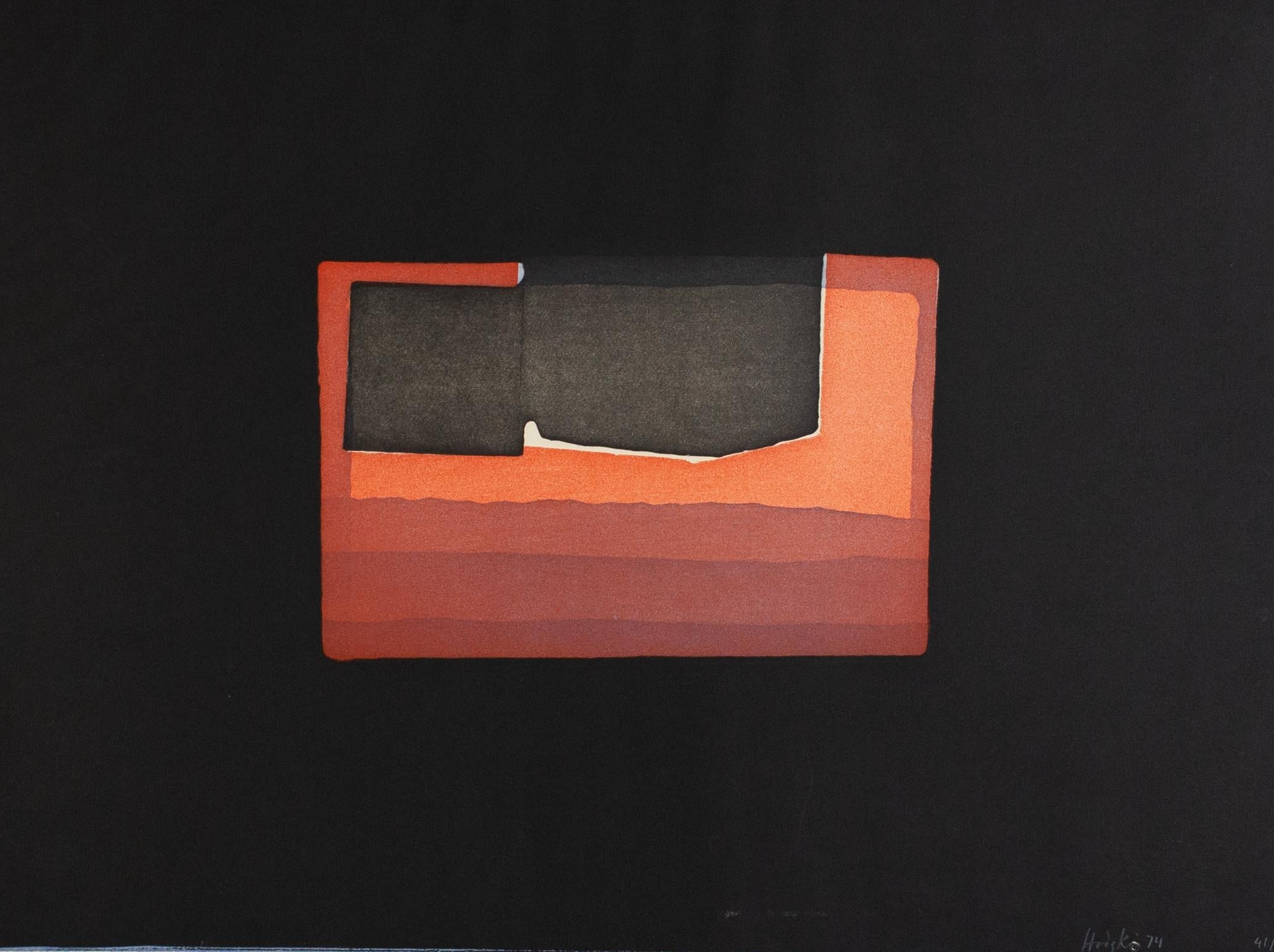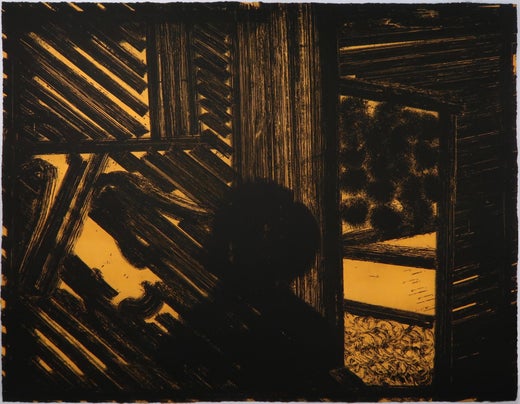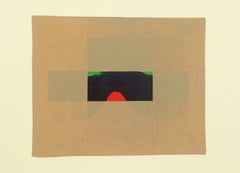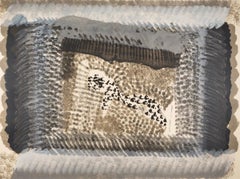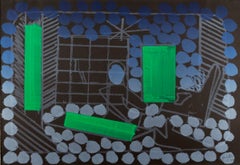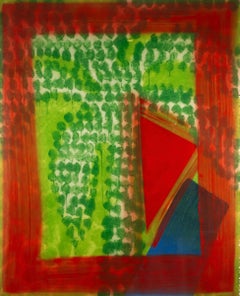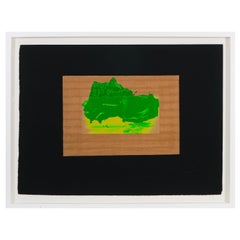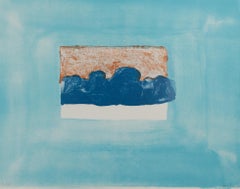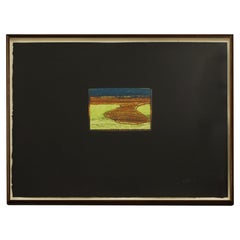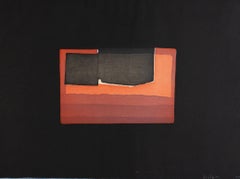Items Similar to Indian View G by Howard Hodgkin, 1971
Want more images or videos?
Request additional images or videos from the seller
1 of 6
Howard HodgkinIndian View G by Howard Hodgkin, 19711971
1971
$3,808.55
£2,850
€3,305.73
CA$5,368.25
A$5,895.38
CHF 3,078.68
MX$70,363.82
NOK 39,003.91
SEK 36,353.18
DKK 24,689.52
About the Item
Indian View G by Howard Hodgkin, 1971
Additional information:
Medium: screenprint in colours on J Green, printed to the edges
22 7/8 x 30 1/2 in
58 x 77.5 cm
signed, dated and numbered 46/75 in pencil
Hodgkin was born in London and grew up in Hammersmith Terrace. During World War II he was evacuated to Long Island, New York, for three years. In the Museum of Modern Art, New York, he saw works by School of Paris artists such as Henri Matisse, Édouard Vuillard, and Pierre Bonnard, which he could not easily have seen then in London or Paris. Back in England in 1943, Hodgkin ran away from Eton College and Bryanston School, convinced that education would impede his progress as an artist, though he encountered inspiring teachers at both schools. He then attended Camberwell School of Arts and Crafts (1949–50) and Bath Academy of Art, Corsham (1950–54).
Hodgkin never belonged to a school or group. While many of his contemporaries were drawn to Pop or the School of London, he remained independent, initially marking his outsider status with a series of portraits of contemporary artists and their families. His first solo exhibition was at Arthur Tooth and Sons in London in 1962. Two years later he first visited India, following his interest in Indian miniatures, which began during his time at Eton. Collecting Indian art would remain a lifelong passion, which he initially supported by dealing in picture frames.
In 1984 Hodgkin represented Britain at the Biennale di Venezia. His exhibition Forty Paintings reopened the Whitechapel Gallery, London, in 1985, and he won the Turner Prize the same year. In 1995–96 Hodgkin had an exhibition at the Metropolitan Museum of Art, New York, which travelled to the Modern Art Museum of Fort Worth, Texas; Kunstverein für die Rheinlande und Westfalen, Düsseldorf; and Hayward Gallery, London. His first full retrospective opened at the Irish Museum of Modern Art, Dublin, in 2006 and traveled to Tate Britain, London, and Museo Nacional Centro de Arte Reina Sofía, Madrid. In the autumn of 2016 Hodgkin visited India for what was to be the last time, completing six new paintings before his return to London. These works were shown at England’s Hepworth Wakefield in 2017, in Painting India, a show that focused on the artist’s long-standing relationship with the Indian subcontinent.
Starting in the 1950s, Hodgkin maintained a parallel printmaking practice, translating his visual language into works on paper. Exploring the interactions of color and space on a grander scale, he produced theatrical set designs for Ballet Rambert, the Royal Ballet, and the Mark Morris Dance Group. His black stone and white marble mural fronts the British Council’s headquarters in New Delhi. Additionally, Hodgkin designed a stamp for the Royal Mail to mark the millennium; textiles for Designers Guild; and posters and prints for the Olympic Games in Sarajevo, London, Sochi, and Rio de Janeiro.
Hodgkin was knighted in 1992 and made a Companion of Honour in 2003. He was awarded the Shakespeare Prize in Hamburg in 1997, and in 2014 won the first Swarovski Whitechapel Gallery Art Icon award.
- Creator:Howard Hodgkin (1932, British)
- Creation Year:1971
- Dimensions:Height: 22.88 in (58.12 cm)Width: 30.5 in (77.47 cm)
- Medium:
- Period:
- Condition:
- Gallery Location:Kingsclere, GB
- Reference Number:1stDibs: LU2718214578212
Howard Hodgkin
Sir Gordon Howard Eliott Hodgkin was a British painter and printmaker. His work is most often associated with abstraction.
About the Seller
No Reviews Yet
Vetted Professional Seller
Every seller passes strict standards for authenticity and reliability
Established in 2010
1stDibs seller since 2024
43 sales on 1stDibs
Typical response time: 8 hours
- ShippingRetrieving quote...Shipping from: Kingsclere, United Kingdom
- Return Policy
More From This Seller
View AllIndian View E by Howard Hodgkin, 1971
By Howard Hodgkin
Located in Kingsclere, GB
Indian View E by Howard Hodgkin, 1971
Additional information:
Medium: screenprint in colours on J Green, printed to the edges
22 3/4 x 30 1/2 in
57.7 x 77.5 cm
signed, dated and numbered 8/75 in pencil
Hodgkin was born in London and grew up in Hammersmith Terrace. During World War II he was evacuated to Long Island, New York, for three years. In the Museum of Modern Art, New York, he saw works by School of Paris artists such as Henri Matisse, Édouard Vuillard, and Pierre Bonnard, which he could not easily have seen then in London or Paris. Back in England in 1943, Hodgkin ran away from Eton College and Bryanston School, convinced that education would impede his progress as an artist, though he encountered inspiring teachers at both schools. He then attended Camberwell School of Arts and Crafts (1949–50) and Bath Academy of Art, Corsham (1950–54).
Hodgkin never belonged to a school or group. While many of his contemporaries were drawn to Pop or the School of London, he remained independent, initially marking his outsider status with a series of portraits of contemporary artists and their families. His first solo exhibition was at Arthur Tooth and Sons in London in 1962. Two years later he first visited India, following his interest in Indian miniatures, which began during his time at Eton. Collecting Indian art would remain a lifelong passion, which he initially supported by dealing in picture frames.
In 1984 Hodgkin represented Britain at the Biennale di Venezia. His exhibition Forty Paintings reopened the Whitechapel Gallery, London, in 1985, and he won the Turner Prize the same year. In 1995–96 Hodgkin had an exhibition at the Metropolitan Museum of Art, New York, which travelled to the Modern Art Museum of Fort Worth, Texas; Kunstverein für die Rheinlande und Westfalen, Düsseldorf; and Hayward Gallery, London. His first full retrospective opened at the Irish Museum of Modern Art, Dublin, in 2006 and traveled to Tate Britain, London, and Museo Nacional Centro de Arte Reina Sofía, Madrid. In the autumn of 2016 Hodgkin visited India for what was to be the last time, completing six new paintings before his return to London. These works were shown at England’s Hepworth Wakefield in 2017, in Painting India, a show that focused on the artist’s long-standing relationship with the Indian subcontinent.
Starting in the 1950s, Hodgkin maintained a parallel printmaking practice, translating his visual language into works on paper. Exploring the interactions of color and space on a grander scale, he produced theatrical set designs for Ballet Rambert, the Royal Ballet, and the Mark Morris Dance Group. His black stone and white marble mural...
Category
21st Century and Contemporary Abstract Prints
Materials
Screen
One Down by Howard Hodgkin, 1981-2
By Howard Hodgkin
Located in Kingsclere, GB
One Down by Howard Hodgkin, 1981-2
Additional information:
Medium: lithograph with hand-colouring in gouache
91.4 x 121.9 cm
36 x 48 in
signed, dated and numbered in pencil
Hodgkin was born in London and grew up in Hammersmith Terrace. During World War II he was evacuated to Long Island, New York, for three years. In the Museum of Modern Art, New York, he saw works by School of Paris artists such as Henri Matisse, Édouard Vuillard, and Pierre Bonnard, which he could not easily have seen then in London or Paris. Back in England in 1943, Hodgkin ran away from Eton College and Bryanston School, convinced that education would impede his progress as an artist, though he encountered inspiring teachers at both schools. He then attended Camberwell School of Arts and Crafts (1949–50) and Bath Academy of Art, Corsham (1950–54).
Hodgkin never belonged to a school or group. While many of his contemporaries were drawn to Pop or the School of London, he remained independent, initially marking his outsider status with a series of portraits of contemporary artists and their families. His first solo exhibition was at Arthur Tooth and Sons in London in 1962. Two years later he first visited India, following his interest in Indian miniatures, which began during his time at Eton. Collecting Indian art would remain a lifelong passion, which he initially supported by dealing in picture frames.
In 1984 Hodgkin represented Britain at the Biennale di Venezia. His exhibition Forty Paintings reopened the Whitechapel Gallery, London, in 1985, and he won the Turner Prize the same year. In 1995–96 Hodgkin had an exhibition at the Metropolitan Museum of Art, New York, which travelled to the Modern Art Museum of Fort Worth, Texas; Kunstverein für die Rheinlande und Westfalen, Düsseldorf; and Hayward Gallery, London. His first full retrospective opened at the Irish Museum of Modern Art, Dublin, in 2006 and traveled to Tate Britain, London, and Museo Nacional Centro de Arte Reina Sofía, Madrid. In the autumn of 2016 Hodgkin visited India for what was to be the last time, completing six new paintings before his return to London. These works were shown at England’s Hepworth Wakefield in 2017, in Painting India, a show that focused on the artist’s long-standing relationship with the Indian subcontinent.
Starting in the 1950s, Hodgkin maintained a parallel printmaking practice, translating his visual language into works on paper. Exploring the interactions of color and space on a grander scale, he produced theatrical set designs for Ballet Rambert, the Royal Ballet, and the Mark Morris Dance Group. His black stone and white marble mural...
Category
21st Century and Contemporary Abstract Prints
Materials
Lithograph
Price Upon Request
Julian and Alexis by Howard Hodgkin 1977-1978
By Howard Hodgkin
Located in Kingsclere, GB
Julian and Alexis by Howard Hodgkin 1977-1978
Additional information:
Medium: lithograph in colours with hand-colouring on Arches
70 x 102 cm
27 1/2 x 40 1/8 in
signed, dated and numbered 19/30 in pencil
Hodgkin was born in London and grew up in Hammersmith Terrace. During World War II he was evacuated to Long Island, New York, for three years. In the Museum of Modern Art, New York, he saw works by School of Paris artists such as Henri Matisse, Édouard Vuillard, and Pierre Bonnard, which he could not easily have seen then in London or Paris. Back in England in 1943, Hodgkin ran away from Eton College and Bryanston School, convinced that education would impede his progress as an artist, though he encountered inspiring teachers at both schools. He then attended Camberwell School of Arts and Crafts (1949–50) and Bath Academy of Art, Corsham (1950–54).
Hodgkin never belonged to a school or group. While many of his contemporaries were drawn to Pop or the School of London, he remained independent, initially marking his outsider status with a series of portraits of contemporary artists and their families. His first solo exhibition was at Arthur Tooth and Sons in London in 1962. Two years later he first visited India, following his interest in Indian miniatures, which began during his time at Eton. Collecting Indian art would remain a lifelong passion, which he initially supported by dealing in picture frames.
In 1984 Hodgkin represented Britain at the Biennale di Venezia. His exhibition Forty Paintings reopened the Whitechapel Gallery, London, in 1985, and he won the Turner Prize the same year. In 1995–96 Hodgkin had an exhibition at the Metropolitan Museum of Art, New York, which travelled to the Modern Art Museum of Fort Worth, Texas; Kunstverein für die Rheinlande und Westfalen, Düsseldorf; and Hayward Gallery, London. His first full retrospective opened at the Irish Museum of Modern Art, Dublin, in 2006 and traveled to Tate Britain, London, and Museo Nacional Centro de Arte Reina Sofía, Madrid. In the autumn of 2016 Hodgkin visited India for what was to be the last time, completing six new paintings before his return to London. These works were shown at England’s Hepworth Wakefield in 2017, in Painting India, a show that focused on the artist’s long-standing relationship with the Indian subcontinent.
Starting in the 1950s, Hodgkin maintained a parallel printmaking practice, translating his visual language into works on paper. Exploring the interactions of color and space on a grander scale, he produced theatrical set designs for Ballet Rambert, the Royal Ballet, and the Mark Morris Dance Group. His black stone and white marble mural...
Category
20th Century Abstract Prints
Materials
Lithograph
Price Upon Request
Street Palm by Howard Hodgkin, 1990-91
By Howard Hodgkin
Located in Kingsclere, GB
Street Palm by Howard Hodgkin, 1990-91
Additional information:
Medium: intaglio print with carborundum from three aluminium plates printed in green, green and yellow (mixed), ultramarine blue and white (mixed), with hand-colouring in vermillion red egg tempera
160 x 137 cm
63 x 54 in
signed with initials, numbered and dated
Hodgkin was born in London and grew up in Hammersmith Terrace. During World War II he was evacuated to Long Island, New York, for three years. In the Museum of Modern Art, New York, he saw works by School of Paris artists such as Henri Matisse, Édouard Vuillard, and Pierre Bonnard, which he could not easily have seen then in London or Paris. Back in England in 1943, Hodgkin ran away from Eton College and Bryanston School, convinced that education would impede his progress as an artist, though he encountered inspiring teachers at both schools. He then attended Camberwell School of Arts and Crafts (1949–50) and Bath Academy of Art, Corsham (1950–54).
Hodgkin never belonged to a school or group. While many of his contemporaries were drawn to Pop or the School of London, he remained independent, initially marking his outsider status with a series of portraits of contemporary artists and their families. His first solo exhibition was at Arthur Tooth and Sons in London in 1962. Two years later he first visited India, following his interest in Indian miniatures, which began during his time at Eton. Collecting Indian art would remain a lifelong passion, which he initially supported by dealing in picture frames.
In 1984 Hodgkin represented Britain at the Biennale di Venezia. His exhibition Forty Paintings reopened the Whitechapel Gallery, London, in 1985, and he won the Turner Prize the same year. In 1995–96 Hodgkin had an exhibition at the Metropolitan Museum of Art, New York, which travelled to the Modern Art Museum of Fort Worth, Texas; Kunstverein für die Rheinlande und Westfalen, Düsseldorf; and Hayward Gallery, London. His first full retrospective opened at the Irish Museum of Modern Art, Dublin, in 2006 and traveled to Tate Britain, London, and Museo Nacional Centro de Arte Reina Sofía, Madrid. In the autumn of 2016 Hodgkin visited India for what was to be the last time, completing six new paintings before his return to London. These works were shown at England’s Hepworth Wakefield in 2017, in Painting India, a show that focused on the artist’s long-standing relationship with the Indian subcontinent.
Starting in the 1950s, Hodgkin maintained a parallel printmaking practice, translating his visual language into works on paper. Exploring the interactions of color and space on a grander scale, he produced theatrical set designs for Ballet Rambert, the Royal Ballet, and the Mark Morris Dance Group. His black stone and white marble mural...
Category
20th Century Abstract Prints
Materials
Intaglio
Price Upon Request
Here We Are In Croydon by Howard Hodgkin, Lithography with Hand Colouring, 1979
By Howard Hodgkin
Located in Kingsclere, GB
Here We Are In Croydon by Howard Hodgkin, 1979
Additional information:
Medium: lithograph with hand-colouring on Moulin d'Auvergne handmade paper, the full sheet printed to the edges
56 x 76 cm
22 1/8 x 29 7/8 in
signed, dated and numbered 30/100 in blue crayon
Hodgkin was born in London and grew up in Hammersmith Terrace. During World War II he was evacuated to Long Island, New York, for three years. In the Museum of Modern Art, New York, he saw works by School of Paris artists such as Henri Matisse, Édouard Vuillard, and Pierre Bonnard, which he could not easily have seen then in London or Paris. Back in England in 1943, Hodgkin ran away from Eton College and Bryanston School, convinced that education would impede his progress as an artist, though he encountered inspiring teachers at both schools. He then attended Camberwell School of Arts and Crafts (1949–50) and Bath Academy of Art, Corsham (1950–54).
Hodgkin never belonged to a school or group. While many of his contemporaries were drawn to Pop or the School of London, he remained independent, initially marking his outsider status with a series of portraits of contemporary artists and their families. His first solo exhibition was at Arthur Tooth and Sons in London in 1962. Two years later he first visited India, following his interest in Indian miniatures, which began during his time at Eton. Collecting Indian art would remain a lifelong passion, which he initially supported by dealing in picture frames.
In 1984 Hodgkin represented Britain at the Biennale di Venezia. His exhibition Forty Paintings reopened the Whitechapel Gallery, London, in 1985, and he won the Turner Prize the same year. In 1995–96 Hodgkin had an exhibition at the Metropolitan Museum of Art, New York, which travelled to the Modern Art Museum of Fort Worth, Texas; Kunstverein für die Rheinlande und Westfalen, Düsseldorf; and Hayward Gallery, London. His first full retrospective opened at the Irish Museum of Modern Art, Dublin, in 2006 and traveled to Tate Britain, London, and Museo Nacional Centro de Arte Reina Sofía, Madrid. In the autumn of 2016 Hodgkin visited India for what was to be the last time, completing six new paintings before his return to London. These works were shown at England’s Hepworth Wakefield in 2017, in Painting India, a show that focused on the artist’s long-standing relationship with the Indian subcontinent.
Starting in the 1950s, Hodgkin maintained a parallel printmaking practice, translating his visual language into works on paper. Exploring the interactions of color and space on a grander scale, he produced theatrical set designs for Ballet Rambert, the Royal Ballet, and the Mark Morris Dance Group. His black stone and white marble mural...
Category
20th Century Abstract Prints
Materials
Handmade Paper, Lithograph
Put Out More Flags by Howard Hodgkin, 1992
By Howard Hodgkin
Located in Kingsclere, GB
Put Out More Flags by Howard Hodgkin, 1992
Additional information:
Medium: etching with aquatint, printed to the edges
42 x 52.5 cm
16 1/2 x 20 5/8 in
signed with initials, dated and inscribed 'For Dave' in pencil
Hodgkin was born in London and grew up in Hammersmith Terrace. During World War II he was evacuated to Long Island, New York, for three years. In the Museum of Modern Art, New York, he saw works by School of Paris artists such as Henri Matisse, Édouard Vuillard, and Pierre Bonnard, which he could not easily have seen then in London or Paris. Back in England in 1943, Hodgkin ran away from Eton College and Bryanston School, convinced that education would impede his progress as an artist, though he encountered inspiring teachers at both schools. He then attended Camberwell School of Arts and Crafts (1949–50) and Bath Academy of Art, Corsham (1950–54).
Hodgkin never belonged to a school or group. While many of his contemporaries were drawn to Pop or the School of London, he remained independent, initially marking his outsider status with a series of portraits of contemporary artists and their families. His first solo exhibition was at Arthur Tooth and Sons in London in 1962. Two years later he first visited India, following his interest in Indian miniatures, which began during his time at Eton. Collecting Indian art would remain a lifelong passion, which he initially supported by dealing in picture frames.
In 1984 Hodgkin represented Britain at the Biennale di Venezia. His exhibition Forty Paintings reopened the Whitechapel Gallery, London, in 1985, and he won the Turner Prize the same year. In 1995–96 Hodgkin had an exhibition at the Metropolitan Museum of Art, New York, which travelled to the Modern Art Museum of Fort Worth, Texas; Kunstverein für die Rheinlande und Westfalen, Düsseldorf; and Hayward Gallery, London. His first full retrospective opened at the Irish Museum of Modern Art, Dublin, in 2006 and traveled to Tate Britain, London, and Museo Nacional Centro de Arte Reina Sofía, Madrid. In the autumn of 2016 Hodgkin visited India for what was to be the last time, completing six new paintings before his return to London. These works were shown at England’s Hepworth Wakefield in 2017, in Painting India, a show that focused on the artist’s long-standing relationship with the Indian subcontinent.
Starting in the 1950s, Hodgkin maintained a parallel printmaking practice, translating his visual language into works on paper. Exploring the interactions of color and space on a grander scale, he produced theatrical set designs for Ballet Rambert, the Royal Ballet, and the Mark Morris Dance Group. His black stone and white marble mural...
Category
21st Century and Contemporary Abstract Prints
Materials
Etching
Price Upon Request
You May Also Like
Howard Hodgkin, Indian View D
By Howard Hodgkin
Located in London, GB
1971
Screenprint in colour
H87 x W68 cm (framed dimensions)
Edition 42/75
Category
Late 20th Century Paintings
Materials
Paint
After Luke Howard, from ‘For John Constable’
By Howard Hodgkin
Located in London, GB
Lithograph from three zinc plates printed in two shades of blue, and sepia. On TH Saunders paper (250 gsm)
Signed and dated 76 in pencil, lower right
Published by Bernard Jacobson Lt...
Category
Late 20th Century Abstract Abstract Prints
Materials
Color, Lithograph
Indian View - L by Howard Hodgkin
By Howard Hodgkin
Located in London, GB
An original screenprint from Indian Views, a set of twelve screenprints inspired by snatched glimpses of the Indian landscape from train windows.
Rather than recording the specifics...
Category
Vintage 1970s English Prints
Materials
Paper
Interior (Night)
By Howard Hodgkin
Located in London, GB
Aquatint from three copper plates printed in black, red, and orange. On cream Velin Arches mould-made paper
Signed, numbered, and dated 74 in pencil, lower right
Published by Petersb...
Category
Late 20th Century Abstract Abstract Prints
Materials
Aquatint
Howard Hodgkin 1981 'Tropical Fruit' HAND SIGNED
By Howard Hodgkin
Located in Brooklyn, NY
Howard Hodgkin's "Tropical Fruit" is a vibrant and evocative work that exemplifies his distinctive approach to abstract art. Hand-initialed "H.H.," dated 1981, and numbered out of an...
Category
1980s Contemporary Prints and Multiples
Materials
Screen
$6,000 Sale Price
20% Off
Alexander Street
By Howard Hodgkin
Located in New York, NY
A superb impression of this color lithograph with hand coloring in watercolor and gouache on Velin Arches mould-made paper. Signed, dated and numbered 88/90 in pencil by Hodgkin. Pri...
Category
1970s Abstract Abstract Prints
Materials
Watercolor, Gouache, Handmade Paper, Color, Lithograph
More Ways To Browse
Swarovski Art
Jewish Pop Art
Joan Miro Barcelona Lithograph
Joan Miro Large
Joan Miro Limited Edition
Joan Mitchell Lithograph
Kenneth Noland Lithograph
Manoela Madera
Matisse Pochoir
Matsutani Takesada
Miro Sobreteixims
Mr Doodle
Noemi Gerstein
Peter Max Flower Abstract
Pia Stern
Print Signed Whitney
Putman Art
Rauschenberg Stoned Moon
